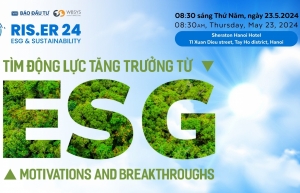ESG funding for sustainable growth
The Vietnam Business Forum’s focus on ESG could not be more timely. It reflects the nation’s commitment to achieving net-zero emissions and adhering to sustainable growth trajectories outlined in the National Green Growth Strategy. Moreover, responding to the demands from international financial institutions and markets, particularly the European Union and the UK, underscores the urgency for Vietnamese businesses to prioritise ESG performance.
 |
| Ramla Khalidi, Resident representative United Nations Development Programme (UNDP) (left) and Iain Frew British Ambassador to Vietnam |
Businesses in Vietnam who wish to export to the EU, or who are part of EU-bound supply chains, will need to prepare for new sustainability requirements, such as those under the Corporate Sustainability Reporting Directive and the Corporate Sustainability Due Diligence Directive.
In the same vein, Vietnamese businesses that supply products or services to UK companies may be expected to report on ESG measures or have proof of good practices. It is increasingly difficult to win a contract with larger companies or the government of the UK without this, as they are required to report various climate-related measures and the company’s climate strategy.
We have seen businesses pay increasing attention to the environmental aspect of ESG, addressing issues like carbon emissions and circular economy practices. This is understandable in a country vulnerable to climate change and grappling with plastic pollution. At the same time, businesses must not to overlook the social and governance dimensions. These pillars are equally vital for driving sustainability and creating long-term value for businesses.
 |
| ESG funding for sustainable growth, illustration photo/ Source: Shutterstock |
The social pillar of ESG assesses how a business manages its impact on workers, customers, and communities. According to the Vietnam ESG Readiness Report 2022, only 16 per cent of businesses operating in Vietnam prioritise social performance. This lack of investment may stem from misconceptions that social investment conflicts with financial returns, posing an operational burden.
However, a closer look at the social indicators suggests numerous potential benefits translating into strong long-term value. These include increased productivity, innovation, stakeholder engagement, reputation enhancement, and investor confidence. The hesitation in assessing social performance may also be partly due to less straightforward or technical indicators. About 70 per cent of Vietnamese businesses lack understanding of ESG reporting data. Luckily, guidelines exist to aid businesses in selecting the appropriate indicators and metrics. For instance, a key guidance on social performance for businesses can be found in the UN Guiding Principles on Business and Human Rights, which can support businesses in social and environmental due diligence.
In Vietnam, the National Action Plan on Responsible Business Practice, which seeks to align Vietnamese policy and law with UN Guiding Principles, has been approved and is under coordination by the Ministry of Justice. The UNDP seeks to continue to support the Ministry of Justice and other government agencies in taking this plan forward.
As part of the wider effort to support, the UNDP and the UK government recently collaborated in a project to actively engage the private sector in anti-corruption and compliance control, encouraging the business community in Vietnam to act collectively to improve the business environment. The business community was provided with knowledge and skills relating to compliance control, risk management, due diligence, and ESG. The UK government is also helping the Ministry of Planning and Investment and the State Securities Commission develop handbooks on ESG framework and climate-related financial risks disclosure for state-owned enterprises, small- and medium-sized enterprises and listed companies.
In Vietnam, governance is a top priority for 62 per cent of businesses. The relatively high priority given to the governance pillar reflects a commitment to responsible conduct, particularly in compliance, anti-corruption, and effective management.
Despite this focus on governance, 76 per cent of businesses surveyed by the ESG Readiness Report 2022 lack a clear ESG governing structure, and 65 per cent do not involve the executive board in related matters. To avoid programmes becoming mere box-ticking exercises, governance structures should manage policy implementation and assess and drive forward business performance for long-term value and impact.
Various assessment frameworks can guide businesses in selecting indicators and metrics that align with their goals and stakeholder needs. Governance initiatives should intersect with other ESG elements, forming a comprehensive toolbox. These initiatives may include integrating it into decision-making processes, conducting regular audits, enhancing transparency and accountability through reporting, and fostering a culture of ethics and integrity.
The UNDP’s SDG Impact Standards, a readily available management practice tool, is designed to guide businesses in effective governance. These standards provide a decision-making framework, helping businesses embed sustainability into their management and decision-making processes while filling gaps in current market practices.
While Vietnamese businesses currently lag in ESG practices, they have the opportunity to leapfrog. Small businesses can leverage their agility and innovation to adapt strategies more effectively. Moreover, they stand to benefit significantly from relevant practices, including talent attraction, access to capital, and operational flexibility.
 | ESG becoming mandatory criteria for sustainable development of business Environmental, social, and governance factors are increasingly becoming a prerequisite component in the investment decision-making process of many investors, with an initiative offered by the Ministry of Planning and Investment. |
 | RIS.ER 24 event taking place at Sheraton Hanoi Hotel on May 23 The RIS.ER 24 conference themed around environmental, social, and governance (ESG) issues will take place on May 23 at the Sheraton Hanoi Hotel, organised by Worldbasesys Co., Ltd in collaboration with Vietnam Investment Review. |
 | ESG Investor Conference discusses need for inclusive partnerships The 2024 Vietnam ESG Investor Conference saw industry leaders and investors converge at New World Saigon in Ho Chi Minh City on May 16-17 to address the pressing challenges posed by climate change and chart a course towards a more equitable future. |
 | ESG conference aims to change mindsets The Sheraton Hotel in Hanoi was host to an environmental, social, and governance (ESG) conference on May 23 with the participation of policymakers and the business community, and in collaboration with VIR and WBS Solution and System Co., Ltd. |
 | How to best navigate the ESG challenges in banking Environmental, social, and governance (ESG) considerations have become increasingly integral to investing and corporate strategies across industries, especially the financial sector. |
What the stars mean:
★ Poor ★ ★ Promising ★★★ Good ★★★★ Very good ★★★★★ Exceptional
 Tag:
Tag:
Related Contents
Latest News
More News
- Ho Chi Minh City launches plan for innovation and digital transformation (February 25, 2026 | 09:00)
- Vietnam sets ambitious dairy growth targets (February 24, 2026 | 18:00)
- Masan Consumer names new deputy CEO to drive foods and beverages growth (February 23, 2026 | 20:52)
- Myriad risks ahead, but ones Vietnam can confront (February 20, 2026 | 15:02)
- Vietnam making the leap into AI and semiconductors (February 20, 2026 | 09:37)
- Funding must be activated for semiconductor success (February 20, 2026 | 09:20)
- Resilience as new benchmark for smarter infrastructure (February 19, 2026 | 20:35)
- A golden time to shine within ASEAN (February 19, 2026 | 20:22)
- Vietnam’s pivotal year for advancing sustainability (February 19, 2026 | 08:44)
- Strengthening the core role of industry and trade (February 19, 2026 | 08:35)





















 Mobile Version
Mobile Version